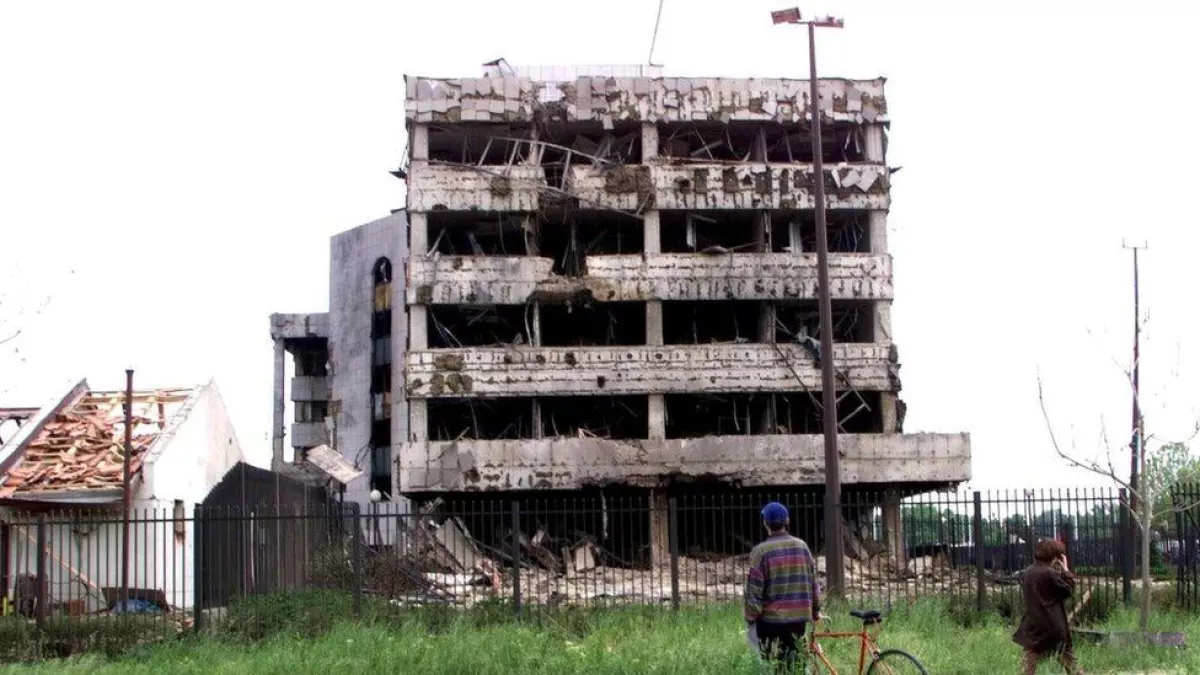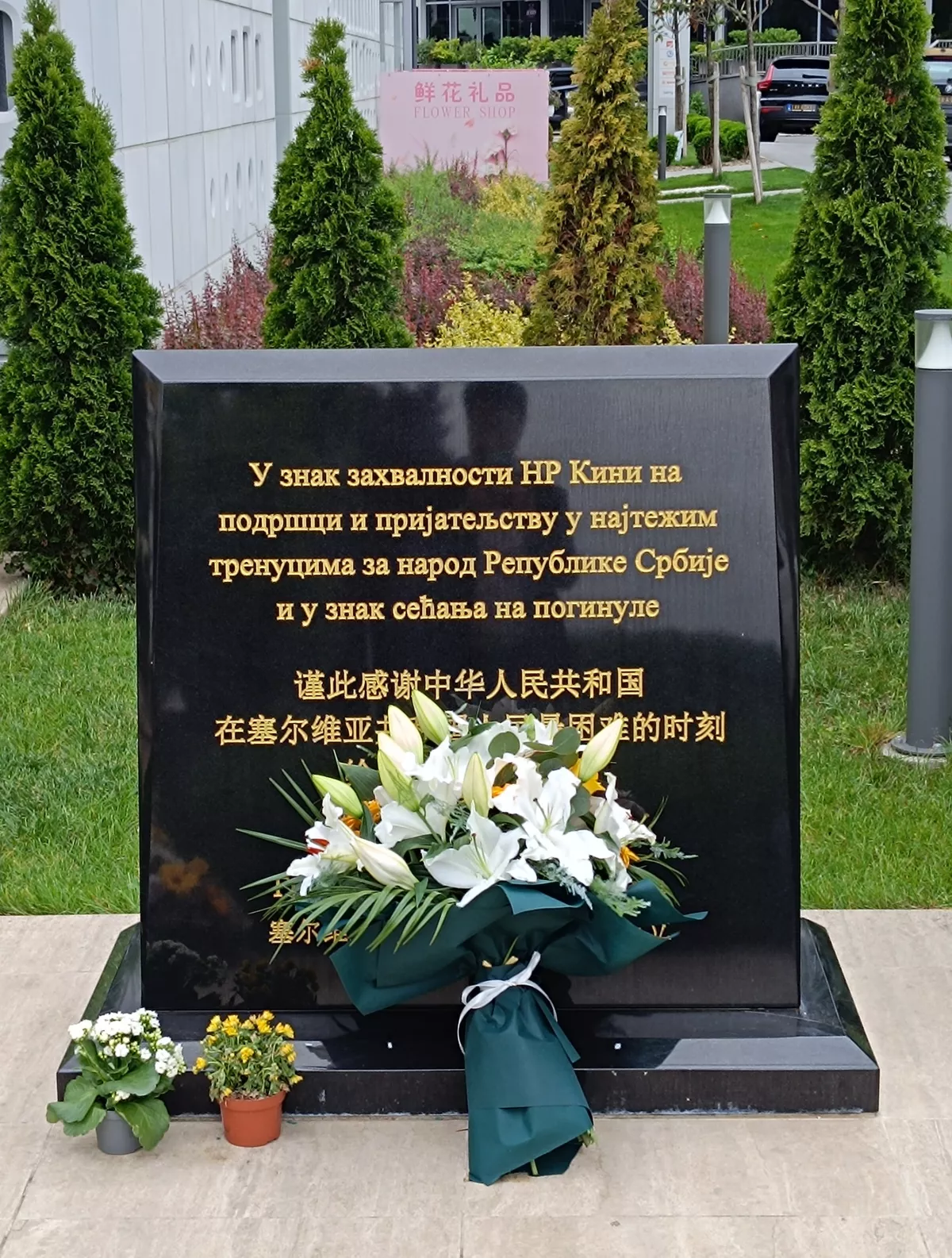How Belgrade memorial service reinforces China, Serbia’s partnership 1999 US-NATO bombing of Chinese embassy
While Chinese President Xi Jinping was on his way to Moscow in early May to participate in the memorial events marking the 80th anniversary of the end of World War II, a lesser known but similarly significant joint commemoration took place in the Southeast of Europe. On the morning of May 7, around 100 Chinese nationals and a dozen Serbs gathered in front of the Chinese Cultural Center in Belgrade, a building that stands on the former site of the Chinese embassy that was bombed by NATO in 1999 during the alliance’s air campaign against Yugoslavia. The memory of the bombing continues to strengthen the China-Serbia partnership, framing their relationship around a vision of a politically and economically "shared future."
The attack, carried out by a US B-2 stealth bomber, killed three Chinese journalists and injured 20 embassy personnel. The Chinese government reacted back then with fury, denouncing the strike as a barbaric act and branding the NATO intervention as an illegal war of aggression. As a an article published by The Diplomat recalls, the incident triggered a rare wave of state-sanctioned anti-American protests in China, with demonstrators surrounding the US embassy in Beijing. Washington apologized for what it claimed was a tragic mistake caused by flawed targeting data, but many Chinese have remained skeptical.
Speculation arose that the bombing may have been deliberate, linked to suspicions that the Chinese had obtained parts of a US stealth fighter shot down by the Yugoslav army weeks earlier. Some even alleged that the embassy was aiding then-Yugoslav President Slobodan Milošević. While these claims were never proven, the article points out that they similarly have not been conclusively refuted.

Commemorations of the bombing have continued in Belgrade over the years. Two plaques mark the site: one erected by the Belgrade municipal government in 2009 and another by the Chinese government in 2016, the latter coinciding with Xi Jinping’s first state visit to Serbia. The 2025 ceremony took place at this site, attended by Serbia’s Minister of Labor, Veterans and Social Affairs Milica Đurđević Stamenkovski and Chinese Ambassador Li Ming, who laid wreaths and delivered speeches condemning NATO’s actions. Ambassador Li stated that NATO had violated Chinese and Serbian sovereignty, as well as international law, and brought regional disasters that continue to affect countries today. Đurđević Stamenkovski described the bombing as a global crime with enduring consequences and emphasized the joint commitment of Serbia and China to preventing future tragedies.
Beijing, Belgrade united against US hegemony
The event was not merely about remembering the three Chinese journalists who died in 1999. In recent years, this annual commemoration has grown into a broader symbol of the “ironclad friendship” between China and Serbia. It is used to express a shared history of victimization by Western powers, and to criticize US hegemony and promote an alternative vision of global governance. The ceremony allows both nations to emphasize mutual support on issues of sovereignty, with China backing Serbia on Kosovo and Serbia returning the favour by supporting China’s position on Taiwan.
An Instagram post from the Chinese ambassador underscored this contrast, portraying NATO as a destructive force and China as a constructive partner. The post noted that while NATO had destroyed vital infrastructure in Serbia, China had since played a major role in rebuilding the country. The tone of this messaging stood in contrast to Xi Jinping’s decision in 2024 to skip visiting the bombing memorial during his trip to Serbia, despite prior preparations. Observers interpreted Xi’s absence as a gesture aimed at reducing diplomatic friction with the US
Ahead of the 2025 ceremony, the Chinese monument was already adorned with flowers, flags, and symbolic imagery. According to the article, a picture of a US B-2 bomber was placed beside a laminated photo of the Chinese aircraft carriers Shandong and Liaoning conducting a joint exercise in October 2024. This visual pairing was meant to convey a message of strength and deterrence: that a now-powerful China would not tolerate similar transgressions in the future.

Economic, political ties link new generations
Although the Serbian government’s monument expresses gratitude to China for its solidarity during a time of hardship, public engagement with the memorial is limited. Few Serbs outside of the official ceremonies visit the site. For many younger Serbs, the bombing and its aftermath are distant history. Their awareness of China is shaped more by its current economic influence than by past military alliances or diplomatic symbolism.
Chinese firms are deeply embedded in Serbia’s development landscape, with the article pointing out that projects led by Chinese companies include the construction of an underground garage at the Serbian Parliament in Belgrade, as well as a sprawling Eurasia shopping mall that replaces the former Chinatown in Blok 70, which burned down in 2024. Several Chinese companies, including Shandong Hi-Speed Group (SDHS), have established their regional headquarters in the Chinese Cultural Center building. SDHS recently completed a major motorway and will oversee construction of the city’s new railway station. The area around Nikola Tesla Airport has evolved into a hub of Chinese-owned businesses, from restaurants and karaoke bars to retail shops and massage parlours.
The local population has largely accepted the Chinese presence as part of the urban fabric. Though some environmental and labour concerns have been raised about Chinese-run mining operations, most Serbs view Chinese investments favourably. Economic benefits, infrastructure improvements, and employment opportunities have helped to cement China’s role as a valuable partner in the eyes of many Serbs. As one local guide remarked, “there may be some price we will have to pay one day for these investments, but at least the Chinese aren’t bombing us.”
By Nazrin Sadigova








